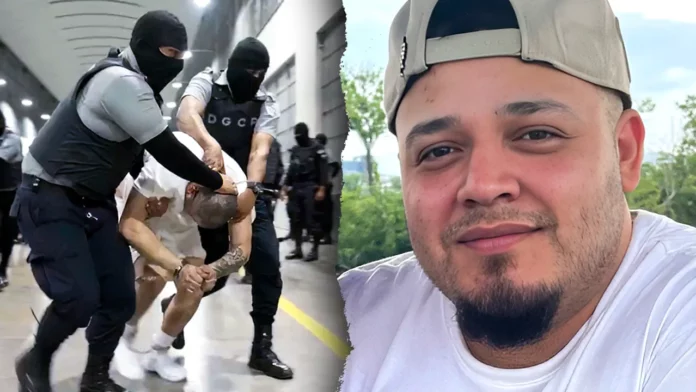
Case Updates
- Legal Paradox: Defense attorneys for Kilmar Abrego Garcia are requesting he remain in Tennessee custody longer, citing fears of immediate deportation under Trump administration policies
- Immigration Crossroads: Federal prosecutors plan to deport Abrego Garcia to a third country, not El Salvador, following his illegal re-entry and human trafficking charges
- Due Process Dilemma: The case highlights complex intersections between immigration enforcement, criminal justice, and due process protections in the current political climate
By Samuel Lopez – USA Herald
WASHINGTON, D.C. – In an unprecedented legal maneuver that underscores the complex realities of immigration enforcement under the Trump administration, attorneys for alleged gang member Kilmar Abrego Garcia have made an unusual request: keep their client locked up longer. The Friday court filing represents a stark reversal from typical defense strategy, driven by fears that immediate release would trigger his immediate deportation.
Earlier this year, Abrego Garcia was deported to his home country of El Salvador, where his gang affiliations made him an immediate target for the country’s aggressive anti-gang initiatives. Upon arrival, he was promptly incarcerated in El Salvador’s notorious CECOT mega-prison, a facility designed specifically to house gang members.
However, Abrego Garcia’s legal team successfully argued that his deportation violated a 2019 immigration court order that had specifically barred his removal to El Salvador. The original protection was granted after Abrego Garcia claimed that rival gangs would kill him if returned to his home country. While the Trump administration argued that this threat no longer existed due to El Salvador’s successful gang eradication efforts, federal courts ultimately ordered his return to the United States.
Following Abrego’s return, he was immediately incarcerated in a Tennessee detention Facility pending a hearing. At the hearing, the judge determined that Abrego Garcia did not pose a flight risk or public safety threat, and ordered his release.
This judicial finding has raised questions among legal observers, particularly given documented evidence of Abrego Garcia’s criminal history. USA Herald’s previous reporting has revealed a pattern of violent behavior, including domestic violence incidents involving his wife, who obtained a temporary restraining order describing physical battery committed in the presence of their children. Additionally, police bodycam footage from the 2022 incident provides visual evidence of alleged human trafficking activities.
Federal prosecutors revealed plans to deport Abrego Garcia to a third country rather than El Salvador, though they characterized these plans as “not imminent.” This revelation prompted the defense team’s unusual request for extended detention, citing lack of trust in Department of Justice representations.
“Because we cannot put any faith in any representation made on this issue by the DOJ, we respectfully request to delay the issuance of the release order,” Abrego Garcia’s attorneys wrote in their filing. They demanded that the Justice Department “provide reliable information concerning its intentions.”
The court agreed to delay his release until a July 16 hearing but emphasized their limited control over immigration enforcement decisions. “The prosecution intends to see this case to resolution. Yet as stated before this Court as recently as June 25, 2025, [the Department of Homeland Security] will and must follow their own process, relevant regulations, the existing federal statutory scheme, and appropriate case law in handling the Defendant’s future immigration proceedings and potential deportation,” prosecutors responded.
Abrego Garcia’s defense team and their unprecedented request for their client to ‘stay-in-jail’ has highlighted what they characterize as prosecutorial inconsistency, noting that the government first argued for due process in bringing him back to face criminal charges, while simultaneously threatening deportation that could prevent those very proceedings.
“The irony of this request is not lost on anyone. After illegally removing Mr. Abrego to El Salvador, the government retrieved him, brought him to this District, and indicted him on baseless charges,” the defense wrote. “And yet the government—a government that has, at all levels, told the American people that it is bringing Mr. Abrego back home to the United States to face ‘American justice’—apparently has little interest in actually bringing this case to trial.”
The defense further argued that the government appears more interested in public relations than actual justice, suggesting that Abrego Garcia has been “brought back only to convict him in the court of public opinion, including with respect to allegations found nowhere in the actual charges.”
Federal prosecutors have clarified that the 2019 order protecting Abrego Garcia constitutes a “withholding of removal” that specifically prevents deportation to El Salvador but does not preclude removal to other countries. This legal distinction is crucial to understanding the current proceedings.
“Given that the Defendant was first deemed deportable back in 2019—and a copy of that order was made an exhibit to the detention hearing by the Defendant’s previous counsel—this should not be a surprise to the defense and is certainly not a surprise to this Court,” prosecutors noted in their response.
They emphasized that it should have been clear from the beginning that “these proceedings would logically include his potential deportation from the United States to another country.”
The defendant’s preference for continued detention over release reflects the reality that freedom could lead to immediate deportation, effectively ending his ability to contest criminal charges in U.S. courts. This creates an unusual situation where incarceration becomes the preferred option for remaining in the U.S.
The July 16 hearing will likely determine the immediate future of Abrego Garcia’s case and ultimate resolution will likely have implications extending far beyond this individual case, potentially influencing how similar situations are handled in the future.
For deeper insights, and exclusive analyses, join me on Patreon at “Legal Insights and Strategies by Samuel Lopez.”
🔗 Follow USA Herald on X @RealUSAHerald


